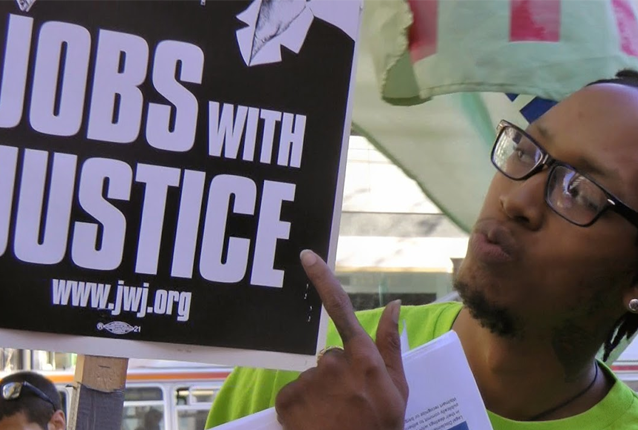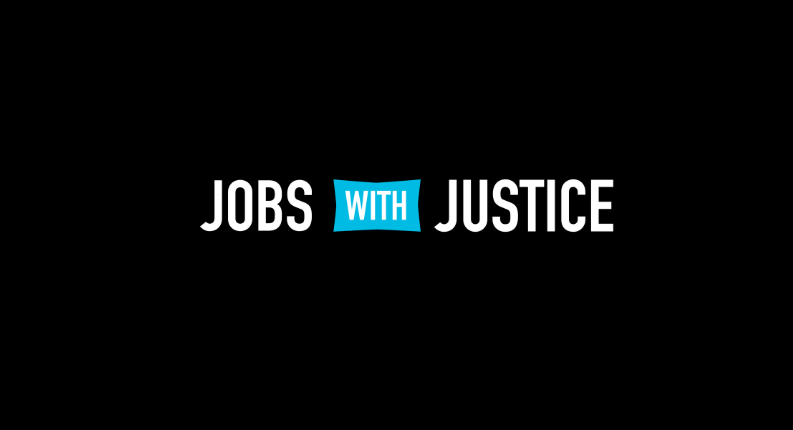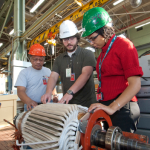by Kung Feng, Jobs With Justice San Francisco | This post originally appeared on RetailWorkersRights.com
Last week, one hundred San Francisco workers and labor activists marched through the Union Square shopping district calling for a $15 minimum wage and fair schedules. Recently, dramatic strikes by fast food and Walmart workers demanding $15 an hour and access to full-time schedules have touched off a national conversation about the growing industry of low-wage service work. Last week’s demonstration by low-wage employees of high-profit companies echoed the ongoing call for better wages and stable schedules.
The rally centered around supporting several recent city ordinances gaining momentum in San Francisco. In November, voters will decide on Proposition J, a ballot measure to increase the minimum wage from $10.74 to $12.25 the next year and to $13, $14 and then $15 in subsequent years. Proposition J also includes an automatic cost of living adjustment in following years. The increase would put San Francisco’s minimum wage as the highest in the nation and could benefit as many as 142,000 San Francisco workers.
But many argue that such a significant increase may not even be enough if workers don’t have access to consistent schedules. In response, demonstrators were calling for the city’s Board of Supervisors to pass the Retail Worker Bill of Rights, a package of policies that would promote full-time work as well as require some employers to provide stable and predictable schedules to employees. The legislation, proposed by a coalition of labor and community groups and spearheaded by Jobs With Justice San Francisco, represents a groundbreaking way to address the crisis of involuntary part-time work and unpredictable schedules that make it difficult for people working part-time to get a second job, or even to know how much to expect in their paycheck each week.
“Hardly anyone gets full-time hours so you come in expecting a decent wage, but at the end of the week, that’s what your paycheck is – weak,” explained Mike Malloy, security officer and member of the Service Employees International Union.
In addition to Malloy, several workers spoke at the rally, including a restaurant worker, a fast food worker, a Walmart worker and a security guard. The diverse crowd reflects the far-reaching impact of the proposed legislation.
“I know this dream is not just my own. I know all of you in many different communities share the same dream,” said Bing Rong Tan, a member of the Chinese Progressive Association who earns the city’s current minimum wage of $10.74 an hour and is forced to live in a single-room occupancy hotel because he is unable to afford anything else.
The demonstrators ended the rally at an Apple store, in light of the recent headlines about the tech sector’s exponential growth in the Bay Area. But some workers have not benefitted from the staggering success of the industry. A growing number of service-sector workers, including thousands of security guards working at Silicon Valley companies like Apple, are struggling to pay for the basics.
Income inequality in San Francisco is growing at the fastest rate in the country, and the story of San Francisco is becoming a tale of two cities, one for the rich and one for the impoverished. But on a windy Wednesday afternoon, as low-wage workers chanted and marched through the streets, they made the city theirs.
Kung Feng is an organizer with Jobs With Justice San Francisco.
For more information on the cutting-edge campaigns in San Francisco:
Proposition J: www.raiseupsf.org
Retail Workers Bill of Rights: www.retailworkerrights.com
Stand For Security: www.standforsecurity.org






This issue is the same across the nation. We cannot afford to eat in our own hospital because of the lousy pay. For top performers, you can get a 3% raise, maybe. In 5 yrs I got a total of a $1.00/hr raise. The upper level managers get decent pay, while we can’t pay the bills. I see a rise in unions coming back-it is our only hope.